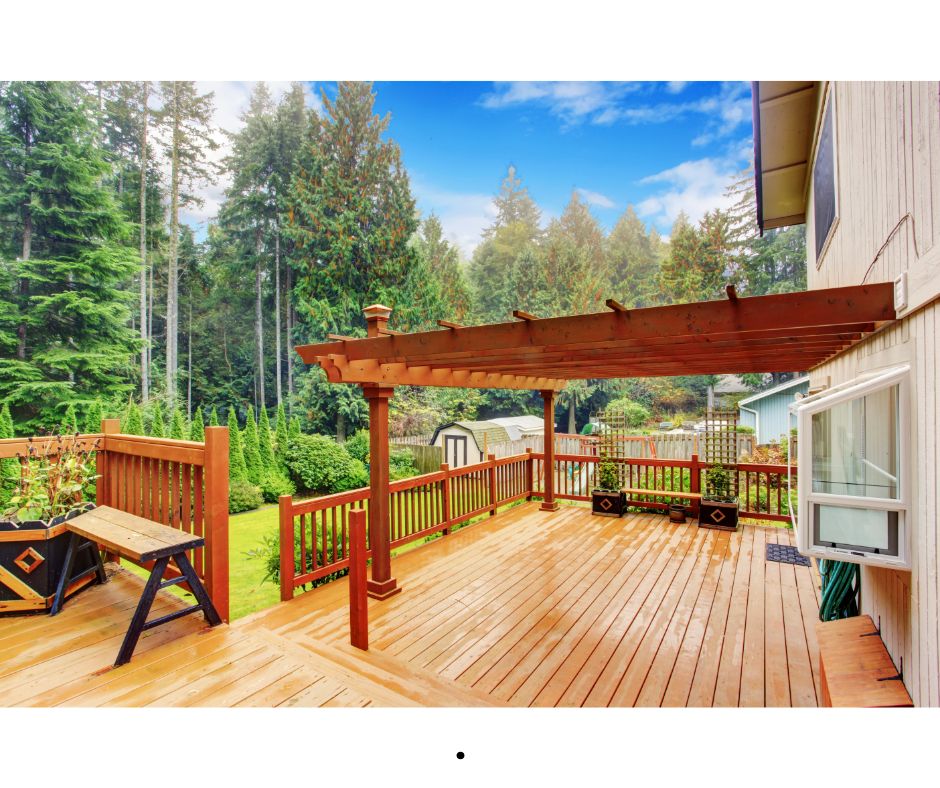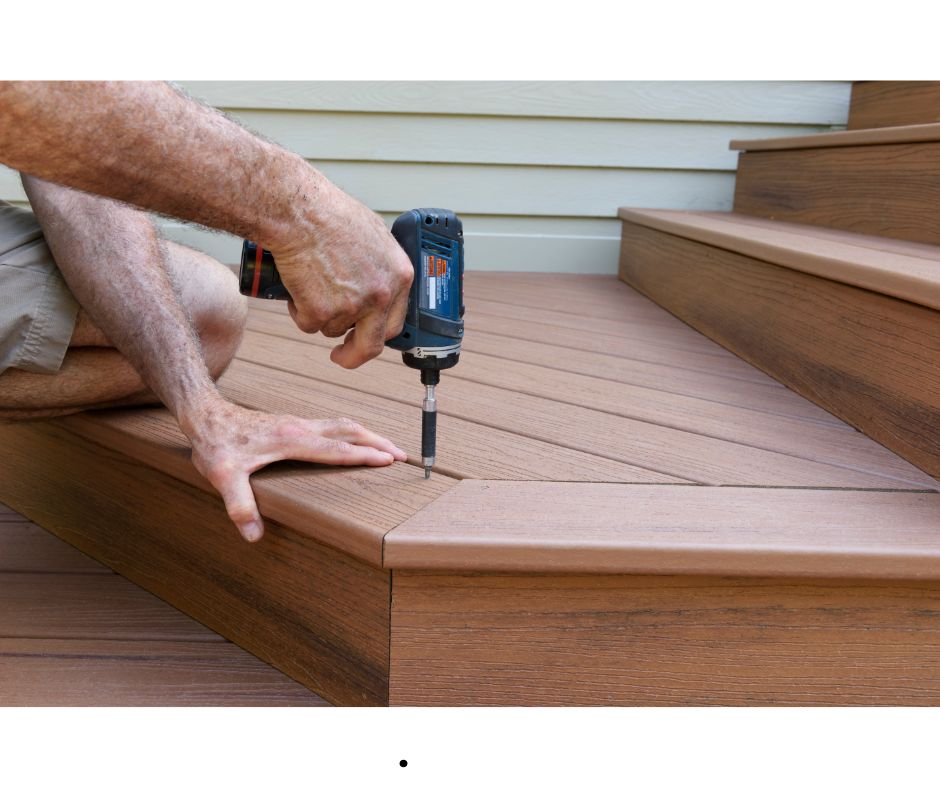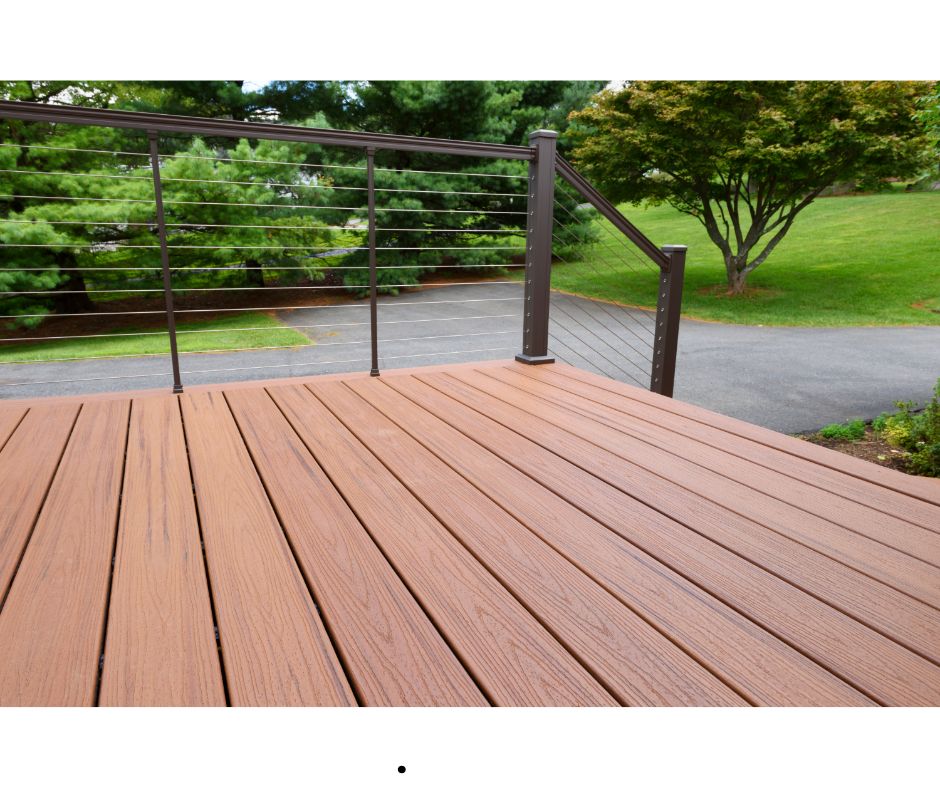Exploring the Best Decking Options: Timber vs. Composite
At Ogden Deck Depot, we understand that choosing the right decking material is essential for creating a stunning outdoor space that stands the test of time. In this comprehensive guide, we delve into the age-old debate between timber and composite decking.
From durability and maintenance to aesthetics and eco-friendliness, we'll dissect the pros and cons of each option to help you make an informed decision for your next decking project. Whether you're a homeowner or a contractor, join us as we navigate the nuances of timber and composite decking to transform your outdoor oasis into a masterpiece.
At Ogden Deck Depot, we understand that choosing the right decking material is essential for creating a stunning outdoor space that stands the test of time. In this comprehensive guide, we delve into the age-old debate between timber and composite decking.
From durability and maintenance to aesthetics and eco-friendliness, we'll dissect the pros and cons of each option to help you make an informed decision for your next decking project. Whether you're a homeowner or a contractor, join us as we navigate the nuances of timber and composite decking to transform your outdoor oasis into a masterpiece.
Pros and Cons of Timber Decking
Timber decking exudes natural beauty and warmth, providing a timeless appeal to outdoor spaces. Its classic aesthetic, affordability, and ease of installation are undeniable advantages.
However, timber requires regular maintenance to combat rot, decay, and insect damage, which can add to long-term costs and efforts.
However, timber requires regular maintenance to combat rot, decay, and insect damage, which can add to long-term costs and efforts.
Advantages of Composite Decking
Composite decking offers a low-maintenance alternative with remarkable durability and resistance to rot, mold, and pests. Its eco-friendly composition, made from recycled materials, appeals to environmentally-conscious consumers.
Although initial costs may be higher, composite decking boasts longevity, color retention, and minimal upkeep, making it a compelling choice for modern outdoor living spaces.
Although initial costs may be higher, composite decking boasts longevity, color retention, and minimal upkeep, making it a compelling choice for modern outdoor living spaces.
Comparing Longevity of Timber vs. Composite
When comparing the longevity of timber and composite decking, several factors come into play. While timber decks can last anywhere from 10 to 30 years with proper maintenance, composite decking typically boasts a longer lifespan of 25 to 30 years or more, often backed by extensive warranties.
Composite's resistance to rot, decay, and fading contributes to its enduring appeal and minimal maintenance requirements over time.
Composite's resistance to rot, decay, and fading contributes to its enduring appeal and minimal maintenance requirements over time.
Timber vs. Composite Decking: Making the Right Choice for Your Outdoor Haven
When it comes to selecting decking material, the choice between timber and composite can be daunting. Timber, with its natural appeal and rustic charm, has long been a favorite among homeowners seeking traditional aesthetics.
Its warmth and character lend a unique touch to outdoor spaces, creating a cozy atmosphere for relaxation and entertainment. However, timber requires regular maintenance to preserve its beauty and structural integrity. From staining and sealing to combating rot and insect infestation, ongoing care is essential to prolong its lifespan.
On the other hand, composite decking offers a modern alternative with remarkable durability and low maintenance requirements. Crafted from a blend of recycled materials, composite boards are engineered to resist rot, decay, and insect damage, ensuring longevity and performance in various weather conditions.
While initial costs may be higher than timber, the long-term savings in maintenance and upkeep make composite decking a compelling choice for homeowners seeking convenience and sustainability in their outdoor living spaces.
Its warmth and character lend a unique touch to outdoor spaces, creating a cozy atmosphere for relaxation and entertainment. However, timber requires regular maintenance to preserve its beauty and structural integrity. From staining and sealing to combating rot and insect infestation, ongoing care is essential to prolong its lifespan.
On the other hand, composite decking offers a modern alternative with remarkable durability and low maintenance requirements. Crafted from a blend of recycled materials, composite boards are engineered to resist rot, decay, and insect damage, ensuring longevity and performance in various weather conditions.
While initial costs may be higher than timber, the long-term savings in maintenance and upkeep make composite decking a compelling choice for homeowners seeking convenience and sustainability in their outdoor living spaces.
Unlocking the Secrets: Timber vs. Composite Decking Demystified
Choosing between timber and composite decking can feel like unraveling a mystery. Timber, with its timeless appeal and natural beauty, has been a staple in outdoor design for generations. Its organic textures and earthy tones create a warm and inviting atmosphere, perfect for enhancing any backyard oasis.
However, the maintenance requirements of timber, including regular staining, sealing, and upkeep, can be a significant consideration for homeowners looking to minimize long-term maintenance efforts.
On the flip side, composite decking offers a modern solution with a blend of technology and sustainability. Made from a combination of wood fibers and recycled plastics, composite boards offer durability, longevity, and resistance to rot, mold, and insects.
While the initial investment in composite decking may be higher, the reduced need for maintenance and the extended lifespan make it a cost-effective and hassle-free option for homeowners seeking a durable and low-maintenance outdoor decking solution.
However, the maintenance requirements of timber, including regular staining, sealing, and upkeep, can be a significant consideration for homeowners looking to minimize long-term maintenance efforts.
On the flip side, composite decking offers a modern solution with a blend of technology and sustainability. Made from a combination of wood fibers and recycled plastics, composite boards offer durability, longevity, and resistance to rot, mold, and insects.
While the initial investment in composite decking may be higher, the reduced need for maintenance and the extended lifespan make it a cost-effective and hassle-free option for homeowners seeking a durable and low-maintenance outdoor decking solution.
The Ultimate Showdown: Timber vs. Composite Decking
In the arena of outdoor decking materials, timber and composite stand as formidable contenders, each with its own set of strengths and weaknesses. Timber, with its natural appeal and classic charm, has been a favorite choice for decking enthusiasts for generations.
Its versatility in design and rustic aesthetic make it an ideal option for those seeking traditional outdoor spaces. However, the susceptibility to rot, decay, and insect infestation can pose challenges, requiring regular maintenance to ensure longevity and structural integrity.
On the other hand, composite decking offers a modern alternative with impressive durability and minimal upkeep. Crafted from a blend of recycled materials, composite boards boast resistance to moisture, mold, and pests, making them an attractive option for homeowners seeking a low-maintenance outdoor solution.
While the initial cost of composite decking may be higher, the long-term savings in maintenance and the extended lifespan make it a worthy investment for those looking for durability and convenience in their outdoor living spaces.
Its versatility in design and rustic aesthetic make it an ideal option for those seeking traditional outdoor spaces. However, the susceptibility to rot, decay, and insect infestation can pose challenges, requiring regular maintenance to ensure longevity and structural integrity.
On the other hand, composite decking offers a modern alternative with impressive durability and minimal upkeep. Crafted from a blend of recycled materials, composite boards boast resistance to moisture, mold, and pests, making them an attractive option for homeowners seeking a low-maintenance outdoor solution.
While the initial cost of composite decking may be higher, the long-term savings in maintenance and the extended lifespan make it a worthy investment for those looking for durability and convenience in their outdoor living spaces.
Navigating the Maze: Timber vs. Composite Decking Options
Choosing between timber and composite decking can feel like navigating through a labyrinth of options, each with its own set of advantages and considerations. Timber, with its natural beauty and timeless appeal, offers a traditional aesthetic that many homeowners find irresistible.
Its warm hues and unique grain patterns create an inviting outdoor space perfect for relaxation and entertaining. However, timber requires regular maintenance to protect against weathering, rot, and insect damage, adding to the overall cost and effort of upkeep.
On the contrary, composite decking presents a modern solution with its durable and low-maintenance composition. Engineered from a blend of recycled materials, composite boards are resistant to rot, mold, and insect infestation, making them a practical choice for busy homeowners.
Although composite decking may have a higher upfront cost, the savings in long-term maintenance and the extended lifespan often outweigh the initial investment, providing homeowners with a hassle-free and sustainable outdoor decking option.
Its warm hues and unique grain patterns create an inviting outdoor space perfect for relaxation and entertaining. However, timber requires regular maintenance to protect against weathering, rot, and insect damage, adding to the overall cost and effort of upkeep.
On the contrary, composite decking presents a modern solution with its durable and low-maintenance composition. Engineered from a blend of recycled materials, composite boards are resistant to rot, mold, and insect infestation, making them a practical choice for busy homeowners.
Although composite decking may have a higher upfront cost, the savings in long-term maintenance and the extended lifespan often outweigh the initial investment, providing homeowners with a hassle-free and sustainable outdoor decking option.
From Forest to Backyard: Timber vs. Composite Decking Explained
The journey from selecting the right decking material to enjoying a beautiful backyard oasis begins with understanding the differences between timber and composite options. Timber decking, harvested from natural forests, brings a sense of authenticity and warmth to outdoor spaces.
Its rich colors and textures create a connection to nature, enhancing the ambiance of any backyard retreat. However, timber requires regular maintenance, including staining, sealing, and occasional repairs, to withstand the elements and maintain its aesthetic appeal over time.
In contrast, composite decking offers a sustainable alternative crafted from a blend of recycled materials, including wood fibers and plastics. This eco-friendly option boasts impressive durability and resistance to moisture, mold, and pests, making it an attractive choice for homeowners seeking a low-maintenance outdoor solution.
While composite decking may have a higher upfront cost, the long-term savings in maintenance and the extended lifespan make it a worthwhile investment for those looking to enjoy their outdoor space with minimal upkeep and maximum enjoyment.
Its rich colors and textures create a connection to nature, enhancing the ambiance of any backyard retreat. However, timber requires regular maintenance, including staining, sealing, and occasional repairs, to withstand the elements and maintain its aesthetic appeal over time.
In contrast, composite decking offers a sustainable alternative crafted from a blend of recycled materials, including wood fibers and plastics. This eco-friendly option boasts impressive durability and resistance to moisture, mold, and pests, making it an attractive choice for homeowners seeking a low-maintenance outdoor solution.
While composite decking may have a higher upfront cost, the long-term savings in maintenance and the extended lifespan make it a worthwhile investment for those looking to enjoy their outdoor space with minimal upkeep and maximum enjoyment.
Decoding Durability: Timber vs. Composite Decking Solutions
When it comes to durability, timber and composite decking offer distinct advantages and considerations. Timber, sourced from natural forests, provides a classic charm and warmth to outdoor spaces. Its sturdy construction and timeless appeal make it a popular choice among homeowners seeking traditional aesthetics.
However, timber is susceptible to rot, decay, and insect infestation, requiring regular maintenance to ensure longevity and structural integrity. Without proper care, timber decks may deteriorate over time, leading to costly repairs or replacement.
Conversely, composite decking presents a modern solution with remarkable durability and minimal maintenance requirements. Crafted from a blend of recycled materials, composite boards are engineered to resist moisture, mold, and pests, ensuring long-term performance in various weather conditions.
While composite decking may have a higher initial cost, the savings in maintenance and the extended lifespan make it a cost-effective and hassle-free option for homeowners seeking durable and low-maintenance outdoor decking solutions.
However, timber is susceptible to rot, decay, and insect infestation, requiring regular maintenance to ensure longevity and structural integrity. Without proper care, timber decks may deteriorate over time, leading to costly repairs or replacement.
Conversely, composite decking presents a modern solution with remarkable durability and minimal maintenance requirements. Crafted from a blend of recycled materials, composite boards are engineered to resist moisture, mold, and pests, ensuring long-term performance in various weather conditions.
While composite decking may have a higher initial cost, the savings in maintenance and the extended lifespan make it a cost-effective and hassle-free option for homeowners seeking durable and low-maintenance outdoor decking solutions.
Beyond Aesthetics: Timber vs. Composite Decking Performance
While aesthetics play a crucial role in selecting decking materials, it's essential to consider the performance aspects of timber and composite options. Timber decking, with its natural beauty and warmth, offers a classic charm that enhances outdoor spaces. Its versatility in design and ability to complement various architectural styles make it a timeless choice for homeowners.
However, timber requires regular maintenance to combat weathering, rot, and insect damage, which can affect its performance over time and necessitate costly repairs.
On the other hand, composite decking provides exceptional performance with minimal upkeep. Crafted from a blend of recycled materials, composite boards offer resistance to moisture, mold, and pests, ensuring durability and longevity in outdoor environments.
While composite decking may have a higher upfront cost, the long-term savings in maintenance and the extended lifespan make it a practical and sustainable choice for homeowners seeking high-performance outdoor decking solutions.
However, timber requires regular maintenance to combat weathering, rot, and insect damage, which can affect its performance over time and necessitate costly repairs.
On the other hand, composite decking provides exceptional performance with minimal upkeep. Crafted from a blend of recycled materials, composite boards offer resistance to moisture, mold, and pests, ensuring durability and longevity in outdoor environments.
While composite decking may have a higher upfront cost, the long-term savings in maintenance and the extended lifespan make it a practical and sustainable choice for homeowners seeking high-performance outdoor decking solutions.
The Decking Dilemma: Timber vs. Composite - Which Reigns Supreme
In the realm of outdoor decking, the choice between timber and composite materials presents a significant dilemma for homeowners. Timber decking, with its natural allure and rustic charm, has been a staple in outdoor design for centuries. Its authentic appeal and timeless aesthetic create inviting spaces for relaxation and entertainment.
However, timber requires regular maintenance to withstand the elements and preserve its beauty, which can be a concern for homeowners seeking convenience and longevity.
Conversely, composite decking emerges as a contender with impressive durability and low maintenance requirements. Crafted from a blend of recycled materials, composite boards offer resistance to rot, mold, and insect damage, ensuring long-lasting performance without the need for frequent upkeep.
While the initial investment in composite decking may be higher, the long-term benefits of durability and minimal maintenance make it a compelling choice for homeowners seeking a hassle-free and sustainable outdoor decking solution.
However, timber requires regular maintenance to withstand the elements and preserve its beauty, which can be a concern for homeowners seeking convenience and longevity.
Conversely, composite decking emerges as a contender with impressive durability and low maintenance requirements. Crafted from a blend of recycled materials, composite boards offer resistance to rot, mold, and insect damage, ensuring long-lasting performance without the need for frequent upkeep.
While the initial investment in composite decking may be higher, the long-term benefits of durability and minimal maintenance make it a compelling choice for homeowners seeking a hassle-free and sustainable outdoor decking solution.
Building for the Future: Timber vs. Composite Decking Considerations
When contemplating decking materials for your outdoor space, it's crucial to consider the long-term implications of your choice. Timber decking, rooted in natural beauty and traditional appeal, has been a popular choice for outdoor projects for generations.
Its warm tones and organic textures evoke a sense of timelessness and connection to nature. However, timber requires regular maintenance to combat wear and tear from the elements, including staining, sealing, and periodic repairs. This ongoing maintenance can add to the overall cost and effort of owning a timber deck, making it essential to weigh the benefits against the upkeep.
On the other hand, composite decking offers a forward-thinking solution with its blend of durability and sustainability. Crafted from recycled materials, composite boards boast impressive resistance to moisture, mold, and pests, ensuring long-lasting performance with minimal maintenance.
While composite decking may require a higher initial investment, the savings in maintenance costs over time make it a smart choice for homeowners looking to build for the future. By considering these factors, you can make an informed decision that aligns with your vision for your outdoor space and your long-term goals.
Its warm tones and organic textures evoke a sense of timelessness and connection to nature. However, timber requires regular maintenance to combat wear and tear from the elements, including staining, sealing, and periodic repairs. This ongoing maintenance can add to the overall cost and effort of owning a timber deck, making it essential to weigh the benefits against the upkeep.
On the other hand, composite decking offers a forward-thinking solution with its blend of durability and sustainability. Crafted from recycled materials, composite boards boast impressive resistance to moisture, mold, and pests, ensuring long-lasting performance with minimal maintenance.
While composite decking may require a higher initial investment, the savings in maintenance costs over time make it a smart choice for homeowners looking to build for the future. By considering these factors, you can make an informed decision that aligns with your vision for your outdoor space and your long-term goals.
Eco-Friendly or Classic Charm: Timber vs. Composite Decking Debate
In the debate between timber and composite decking, eco-friendliness and classic charm take center stage. Timber, sourced from natural forests, offers a timeless aesthetic that many homeowners find irresistible. Its rustic appeal and warm tones create inviting outdoor spaces perfect for relaxation and entertainment.
However, concerns about deforestation and environmental impact raise questions about the sustainability of timber decking. Without proper forest management practices, the harvesting of timber can contribute to habitat destruction and biodiversity loss.
In contrast, composite decking presents an eco-friendly alternative crafted from recycled materials, including wood fibers and plastics. By repurposing waste materials, composite decking reduces the demand for virgin resources and minimizes environmental impact.
Additionally, composite boards require minimal maintenance, reducing the need for chemical treatments and preserving natural habitats. While the initial cost of composite decking may be higher, the long-term benefits of sustainability and durability make it a compelling choice for environmentally-conscious homeowners.
By weighing the pros and cons of each option, you can make an informed decision that aligns with your values and priorities.
However, concerns about deforestation and environmental impact raise questions about the sustainability of timber decking. Without proper forest management practices, the harvesting of timber can contribute to habitat destruction and biodiversity loss.
In contrast, composite decking presents an eco-friendly alternative crafted from recycled materials, including wood fibers and plastics. By repurposing waste materials, composite decking reduces the demand for virgin resources and minimizes environmental impact.
Additionally, composite boards require minimal maintenance, reducing the need for chemical treatments and preserving natural habitats. While the initial cost of composite decking may be higher, the long-term benefits of sustainability and durability make it a compelling choice for environmentally-conscious homeowners.
By weighing the pros and cons of each option, you can make an informed decision that aligns with your values and priorities.
Conclusion
The debate between timber and composite decking is a nuanced one, with each option presenting its own set of advantages and considerations. While timber decking offers classic charm and natural beauty, it demands regular maintenance to preserve its aesthetic appeal.
On the other hand, composite decking provides durability and sustainability, albeit with a potentially higher upfront cost. By carefully weighing factors such as aesthetics, maintenance requirements, and environmental impact, homeowners can make an informed decision that best suits their needs and preferences for outdoor living spaces.
For expert guidance and assistance in selecting the ideal decking solution for your home, reach out to our team at Ogden Deck Depot. Our experienced professionals are here to provide personalized recommendations, answer any questions you may have, and ensure that your outdoor decking project exceeds your expectations.
Contact us today to embark on the journey towards creating your dream outdoor oasis.
On the other hand, composite decking provides durability and sustainability, albeit with a potentially higher upfront cost. By carefully weighing factors such as aesthetics, maintenance requirements, and environmental impact, homeowners can make an informed decision that best suits their needs and preferences for outdoor living spaces.
For expert guidance and assistance in selecting the ideal decking solution for your home, reach out to our team at Ogden Deck Depot. Our experienced professionals are here to provide personalized recommendations, answer any questions you may have, and ensure that your outdoor decking project exceeds your expectations.
Contact us today to embark on the journey towards creating your dream outdoor oasis.





